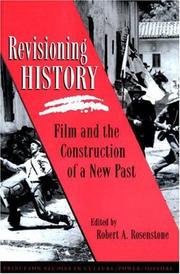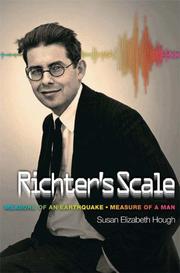| Listing 1 - 3 of 3 |
Sort by
|

ISBN: 0691025347 069108629X 0691209707 Year: 1995 Volume: *5 Publisher: Princeton (N.J.): Princeton university press
Abstract | Keywords | Export | Availability | Bookmark
 Loading...
Loading...Choose an application
- Reference Manager
- EndNote
- RefWorks (Direct export to RefWorks)
In Revisioning History thirteen historians from around the world look at the historical film on its own terms, not as it compares to written history but as a unique way of recounting the past. How does film construct a historical world? What are the rules, codes, and strategies by which it brings the past to life? What does that historical construction mean to us? In grappling with these questions, each contributor looks at an example of New History cinema. Different from Hollywood costume dramas or documentary films, these films are serious efforts to come to grips with the past; they have often grown out of nations engaged in an intense quest for historical connections, such as India, Cuba, Japan, and Germany. The volume begins with an introduction by Robert Rosenstone. Part I, "Contesting History," comprises essays by Geoff Eley (on the film Distant Voices, Still Lives), Nicholas B. Dirks (The Home and the World), Thomas Kierstead and Deidre Lynch (Eijanaika), and Pierre Sorlin (Night of the Shooting Stars). Contributing to Part II, "Visioning History," are Michael S. Roth (Hiroshima Mon Amour), John Mraz (Memories of Underdevelopment), Min Soo Kang (The Moderns) and Clayton R. Koppes (Radio Bikini). Part III, "Revisioning History" contains essays by Denise J. Youngblood (Repentance), Rudy Koshar (Hitler: A Film from Germany), Rosenstone (Walker), Sumiko Higashi (Walker and Mississippi Burning), and Daniel Sipe (From the Pole to the Equator).
Cinéma et histoire --- Film en geschiedenis --- Histoire au cinéma --- Histoire et cinéma --- Motion pictures and history --- #SBIB:309H1328 --- Films met een ideologische en spiegelfunctie --- #SBIB:309H1329 --- History and motion pictures --- Moving-pictures and history --- History --- Films met een informatieve functie (met inbegrip van de documentaire film) --- Motion pictures and history. --- Cinéma et histoire --- Animal Farm. --- Another Country. --- Barry Lyndon. --- Casablanca. --- Gilda. --- Heart of Spain. --- Holiday Camp. --- Kind of Loving. --- Last Tango in Paris. --- Life Is Sweet. --- Madonna and Child. --- Masterpiece Theater. --- Night of the Shooting Stars. --- One Way or Another. --- Other Francisco. --- Rain Man. --- Rybakov. --- Sid and Nancy. --- Star Trek. --- Three Daughters. --- Trip. --- Triumph of the Will. --- Vengeance Is Mine. --- White Mischief. --- Yojimbo. --- paisan. --- the Bodyguard.

ISBN: 1400884446 0691128073 9780691128078 9781400884445 0691173281 9780691173283 Year: 2016 Publisher: Princeton, NJ
Abstract | Keywords | Export | Availability | Bookmark
 Loading...
Loading...Choose an application
- Reference Manager
- EndNote
- RefWorks (Direct export to RefWorks)
By developing the scale that bears his name, Charles Richter not only invented the concept of magnitude as a measure of earthquake size, he turned himself into nothing less than a household word. He remains the only seismologist whose name anyone outside of narrow scientific circles would likely recognize. Yet few understand the Richter scale itself, and even fewer have ever understood the man. Drawing on the wealth of papers Richter left behind, as well as dozens of interviews with his family and colleagues, Susan Hough takes the reader deep into Richter's complex life story, setting it in the context of his family and interpersonal attachments, his academic career, and the history of seismology. Among his colleagues Richter was known as intensely private, passionately interested in earthquakes, and iconoclastic. He was an avid nudist, seismologists tell each other with a grin; he dabbled in poetry. He was a publicity hound, some suggest, and more famous than he deserved to be. But even his closest associates were unaware that he struggled to reconcile an intense and abiding need for artistic expression with his scientific interests, or that his apparently strained relationship with his wife was more unconventional but also stronger than they knew. Moreover, they never realized that his well-known foibles might even have been the consequence of a profound neurological disorder. In this biography, Susan Hough artfully interweaves the stories of Richter's life with the history of earthquake exploration and seismology. In doing so, she illuminates the world of earth science for the lay reader, much as Sylvia Nasar brought the world of mathematics alive in A Beautiful Mind.
Richter scale. --- Seismologists --- Earthquakes. --- Richter, Charles, --- Quakes (Earthquakes) --- Scale, Richter --- Richter, Charles F. --- Richter, C. F. --- Richter, Charles Francis, --- Earth movements --- Natural disasters --- Seismology --- Earthquake magnitude --- Geophysicists --- Measurement --- 1811–12 New Madrid earthquakes. --- 1952 Kern County earthquake. --- Active fault. --- Allen Say. --- American Association of Variable Star Observers. --- Another Woman. --- Asperger syndrome. --- Autism. --- Barbara McClintock. --- Benioff. --- Beno Gutenberg. --- Book. --- Boris Podolsky. --- Calculation. --- Career. --- Charles Francis Richter. --- Child abuse. --- Clarence Allen (geologist). --- Classic book. --- Disaster. --- Distrust. --- Dr. Seuss. --- Dysfunctional family. --- Earthquake insurance. --- Earthquake prediction. --- Electra complex. --- Emerging technologies. --- Emotional baggage. --- Ernest Rutherford. --- Female hysteria. --- Field Act. --- Foreshock. --- Freaks. --- Geologist. --- Graduate school. --- Grandparent. --- Hanks. --- Harold Jeffreys. --- Headline. --- Hiking. --- Hiroo Kanamori. --- His Family. --- Hugo Benioff. --- Hypothyroidism. --- I Wish (manhwa). --- IBM Selectric typewriter. --- In Death. --- Inception. --- Incest. --- Indication (medicine). --- Industrial Workers of the World. --- Inge Lehmann. --- Joan Baez. --- Keiiti Aki. --- Lord Byron. --- Luke Jackson (author). --- Margaret Atwood. --- Mark Storey. --- Meanness. --- Modern physics. --- Mount Wilson Observatory. --- Mrs. --- National security. --- Neurosis. --- Nobel Prize in Physiology or Medicine. --- Nobel Prize. --- Nuclear family. --- Nuclear winter. --- Obsessive–compulsive disorder. --- Plate tectonics. --- Political correctness. --- Popular Science. --- Prediction. --- Procrastination. --- Quantum mechanics. --- Racism. --- Rain Man. --- Ramapo Fault. --- Richter magnitude scale. --- San Andreas Fault. --- Scientist. --- Seismological Society of America. --- Seismology. --- Seismometer. --- Southern California. --- Supervisor. --- Sylvia Nasar. --- Symptom. --- T. S. Eliot. --- Testimonial. --- The Parliament of Man. --- The Tumor. --- Thomas Wolfe. --- To This Day. --- Total loss. --- Treasure trove. --- Tsunami. --- V. --- Virginia Woolf. --- Writing.
Book
ISBN: 1280494077 9786613589309 1400842301 9781400842308 9780691154725 0691154724 Year: 2012 Publisher: Princeton, N.J. Princeton University press
Abstract | Keywords | Export | Availability | Bookmark
 Loading...
Loading...Choose an application
- Reference Manager
- EndNote
- RefWorks (Direct export to RefWorks)
A woman glances at a broken clock and comes to believe it is a quarter past seven. Yet, despite the broken clock, it really does happen to be a quarter past seven. Her belief is true, but it isn't knowledge. This is a classic illustration of a central problem in epistemology: determining what knowledge requires in addition to true belief. In this provocative book, Richard Foley finds a new solution to the problem in the observation that whenever someone has a true belief but not knowledge, there is some significant aspect of the situation about which she lacks true beliefs--something important that she doesn't quite "get." This may seem a modest point but, as Foley shows, it has the potential to reorient the theory of knowledge. Whether a true belief counts as knowledge depends on the importance of the information one does or doesn't have. This means that questions of knowledge cannot be separated from questions about human concerns and values. It also means that, contrary to what is often thought, there is no privileged way of coming to know. Knowledge is a mutt. Proper pedigree is not required. What matters is that one doesn't lack important nearby information. Challenging some of the central assumptions of contemporary epistemology, this is an original and important account of knowledge.
Belief and doubt. --- Knowledge, Theory of. --- Conviction --- Doubt --- Consciousness --- Credulity --- Emotions --- Knowledge, Theory of --- Philosophy --- Psychology --- Religion --- Will --- Agnosticism --- Rationalism --- Skepticism --- Epistemology --- Theory of knowledge --- Belief and doubt --- Edmund Gettier. --- Gettier game. --- Peter Klein. --- Rain Man. --- a priori knowledge. --- accurate beliefs. --- adequate information view. --- adequate information. --- associated truths. --- autobiographical knowledge stories. --- awareness. --- belief system. --- belief. --- beliefs. --- blind luck. --- collective acceptance. --- collective knowledge. --- comprehensive beliefs. --- conjunctions. --- contemporary epistemology. --- contingent truths. --- counterfactual truths. --- crucial information. --- deception. --- defeasibility theory. --- defeasibility. --- demon hypothesis. --- disjunctions. --- epistemically rational belief. --- epistemology. --- facts. --- fiction. --- first-person beliefs. --- fixedness. --- general theory of rationality. --- global luck. --- human concerns. --- human values. --- ignorance. --- imagination. --- important truths. --- indefeasible justification. --- independent information. --- individual achievements. --- individual beliefs. --- individual human knowledge. --- individual knowledge. --- information gap. --- information gaps. --- information. --- inquiry. --- instability. --- intellectual specialization. --- introspective knowledge. --- intuitions. --- justification theorists. --- justification-based theories. --- justification. --- justifications. --- justified belief. --- justified true belief. --- knowledge block. --- knowledge blocks. --- knowledge gap. --- knowledge stories. --- knowledge. --- literary devices. --- local luck. --- lottery stories. --- lottery ticket. --- lottery. --- luck. --- lucky knowledge. --- misleading defeaters. --- missing information. --- morals. --- narrow knowledge. --- necessary truths. --- neighboring opinions. --- nondefective justification. --- ordinary belief. --- perceptual knowledge. --- philosophical problems. --- pragmatism. --- preface. --- rational belief. --- rationality. --- reliability theories. --- reliability theorists. --- reliability. --- reoriented epistemology. --- reverse lottery stories. --- skepticism. --- tests. --- theory of justified belief. --- theory of knowledge. --- tracking theories. --- true belief value. --- true belief. --- true beliefs. --- truth tracking. --- truth. --- truths. --- unstable beliefs. --- value. --- winning ticket. --- working familiarity.
| Listing 1 - 3 of 3 |
Sort by
|

 Search
Search Feedback
Feedback About UniCat
About UniCat  Help
Help News
News